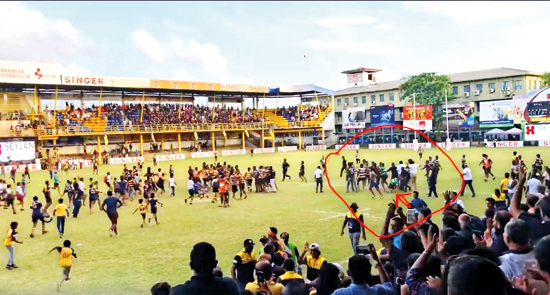Schools Rugby: A Cardinal look
View(s):
The incident that took place soon after the Schools League decider between Royal and St. Joseph's
The Daily Mirror reported on April 25, “I would have cancelled all the Masses and Services during Holy Week, if the Government had informed me of an imminent terror attack,” said Archbishop of Colombo, Malcolm Cardinal Ranjith.
The statement has a deeper meaning than being about a system failure. It is about the value of life. The premier Catholic institution under the leadership of Malcolm Cardinal Ranjith- St. Joseph’s College, has been on the bad side of news, after an assault on a referee. Drilling deeper, the incident mirrors the repercussions from a desire to win, than give life to much more than 250. While asking for action against the people responsible for not giving leadership, Your Eminence should also ask why those appointed to lead a generation of young, failed to instill a semblance of values, rather than be buoyed by a win at Rugby.
Royal College retained the Singer Schools Rugby League title. They beat St. Joseph’s in the deciding match with a bonus point, denying St. Peter’s College the title. Both St. Peter’s and Royal lost one match each during the League. Winners Royal though having lost to St. Peter’s clinched the top slot.
The, match unfortunately, will be remembered more because of the partisan crowd and the post-match hooliganism. The crowd was hostile to the match officials, as supporters of both teams, wanted a win. The coaching staff and benefactors of both sides had a point to prove. The environment was one of aggression.
The behavior of one, or some, can cause irrevocable damage to any hallowed institution. In the light of the hero of the post-Easter Bombing- Cardinal Malcolm Ranjth, still taking the limelight, the action by boys of the No.1 institution in his flock, is deplorable.
Video clips, photographs and explanations have taken social media space and gone viral. It is not only the punching and challenging, but there are also photos of a Royal player biting a Josephian. The flipside is when a so-called knowledge base thinks there is no issue in it. World Rugby has severe sanctions listed for biting.
Another comment on social media, by a staunch launcher of import substitution and a proponent of the need to muscle Referees, is shifting the blame on to others.
Like the Sri Lanka hierarchy, passing responsibility to those below, for the Easter morning bombings, he seems to be casting the blame on a Committee, for the recruitment of the culprit player. In his words, he did fight against the import, but was overruled. The cry now is, “I will do everything, to see that theculprit is given a dishonorable discharge”.
Like the infamous Easter Sunday massacre, what is offered is a pathetic explanation, after the damage is done.
World Rugby says, “All Unions, Associations, Rugby Bodies, Clubs and Persons must ensure that the Game is played and conducted in accordance with disciplined and sporting behavior, and acknowledge that it is not sufficient to rely solely upon the Match Officials to maintain those principles.”
As reported in this paper last week, the Master-in-Charge of Rugby, probably speaking on behalf of the school, soft-paddling the issue says, “He is not a bad player but, unfortunately, something bad took place from a school player, which is unacceptable. He has to face the consequences for his actions, I’m afraid”.
Tell me seriously, does history show this player at the receiving end of a number of ‘Red’ and ‘Yellow’ cards. The talented player is a culprit issue of a system failure.
According to Mathew 7.17: “A good tree cannot bear bad fruit, and a bad tree cannot bear good fruit. Every tree that does not bear good fruit is cut down and thrown into the fire.”
These words should be a daily cup to his Eminence, who is doing a great job, in taking the leadership of this country to task.
It was obvious, that there was to be pressure on players as well as the match officials, in this last match. Particularly, as it was the same Referee who made that last 30-second decision, which signaled that the Joes , not only lost the game, but also the League. Seeing Priyantha Gunaratne again was probably, an invitation to disaster. Who was shortsighted?
The scavenger (as in the fish tank), who said on social media, he came to clean up the Referees Society, said they were faced with an under-performing Referee asking for a farewell match, and the other two top rankers being on a smoky cloud for their performance. The logical choice was Gunaratne, who had a decent game the previous week.
The pressure was on the Referee, who attracted the wrath of the players. The friction was apparent, with the Referee told there is no need for a team brief, as the previous week too you did the brief. The fact that the puncher was the same player who was penalised in the last 30 seconds, and lost the match. Can this be inferred as premeditated.
The hostility was apparent, before the whistle was blown, and treated as a hostile affair, and the hosts asked to ensure the safety of Match Officials. Just as much as the players have been punished, what has anybody done about the host team falling short in protecting the Referee. In 2007, Trinity took responsibility for failure as hosts, and reimbursed the hospital bills of the Referee, arising from a player assault.
 The player responsible for the misconduct has been handed a 2-year ban and cannot be involved in Rugby. The other has been warned and discharged.
The player responsible for the misconduct has been handed a 2-year ban and cannot be involved in Rugby. The other has been warned and discharged.
The WR Regulation says, “If a Judicial Committee (JC) or Judicial Officer (JO) determines that an act or acts of Misconduct have been committed then, it/he shall receive and consider representations on sanctions. The JCs and JOs shall be entitled to impose such sanction as they think fit on the Union, Person and/or Player and/or other party concerned including, but not limited to, the following: (a) a caution, warning as to future conduct, reprimand. ”
The warn and discharge is also a sanction taking into account other mitigating factors such as the previous record. It is not being cleared as some want others to believe.
The regulations also states, “All participants in the Game, by means of their participation, recognise and agree to be bound by the principle of universality, which means that Players, who are suspended at any level of the Game, shall have their suspension recognised and applied at all levels of the Game, and in the territories of all member Unions and Associations”.
Applicable all involved is Luke 6.42 and Mathew 7.13; “Why do you look at the speck in your brother’s eye, but fail to notice the beam in your own eye?”
Vimal Perera is a former Rugby Referee, Coach and an Accredited Referees’ Evaluator IRB


